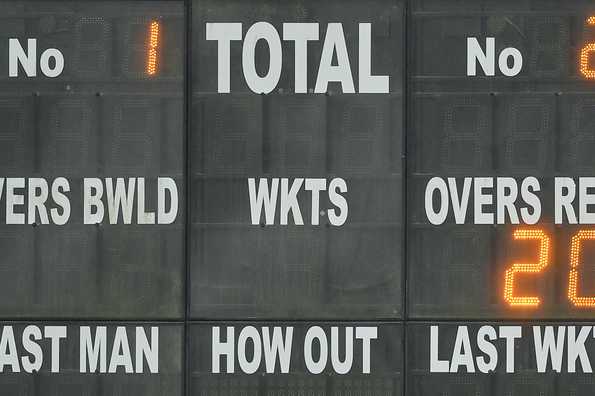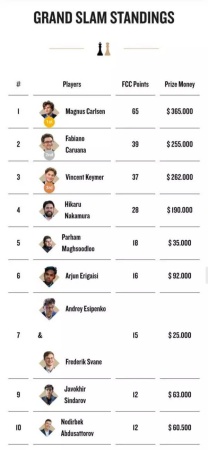The International Cricket Council (ICC) has announced modifications to the playing conditions for Twenty20 Internationals (T20Is), primarily affecting PowerPlay calculations. The key adjustment involves rounding the length of the PowerPlay to the nearest ball, rather than the nearest over, ensuring greater proportional accuracy.

Under the previous regulations, the first six overs constituted the PowerPlay, representing approximately 30% of a standard 20-over innings. Shortening the innings could lead to significant discrepancies when rounding to the nearest over.
When the number of overs for the batting team is reduced, the number of PowerPlay overs will be adjusted according to the following table. This applies to both the first and second innings of a match.
| Match reduced (overs) | Powerplay overs |
|---|---|
| 5 | 1.3 |
| 6 | 1.5 |
| 7 | 2.1 |
| 8 | 2.2 |
| 9 | 2.4 |
| 10 | 3 |
| 11 | 3.2 |
| 12 | 3.4 |
| 13 | 3.5 |
| 14 | 4.1 |
| 15 | 4.3 |
| 16 | 4.5 |
| 17 | 5.1 |
| 18 | 5.2 |
| 19 | 5.4 |
Previously, an 8-over innings would have two PowerPlay overs, while a 9-over innings would have three. With the updated table, the PowerPlay will conclude after 2.2 and 2.4 overs, respectively, maintaining a proportion closer to 30%.
The ICC stated that this table has been successfully used in the T20 Blast in England for several years without causing issues for players or officials. The ICC Men's Cricket Committee has accepted it as the preferred method moving forward. In the 8-over example, the umpire will signal the end of the PowerPlay after two balls of the third over, allowing three additional fielders to move outside the inner circle.
The ICC had previously advised that concussion replacements in Men's T20I matches must be identified and named before the match commences. This aims to create a level playing field by eliminating the home team's advantage of having a larger player pool. The preferred approach involves nominating the following concussion replacements to the match referee before the game:
The ICC acknowledged that Associate Member teams playing T20I matches might find it challenging to identify five specific concussion replacement players for each match, particularly when playing overseas with limited player availability. The system adopted for Associate Member T20Is will address this.
Teams can nominate a batter as a replacement wicketkeeper. However, the referee may require the nominated batter to keep wicket if used as the replacement wicketkeeper. Alternatively, the referee may allow another player from the starting XI to keep wicket instead, but this is at the referee's discretion and not guaranteed. The goal is a like-for-like replacement, not to gain an advantage with a different batter.
Teams can nominate the same player for multiple categories. For example, if an all-rounder is nominated for more than one position and replaces a batter, the referee will likely restrict them from bowling as they are a batter replacement. There has never been a requirement for the concussion replacement to be restricted to the playing squad, and this remains the case. Teams can nominate anyone eligible to play for them.
The overriding principle of a like-for-like concussion replacement remains in effect, and the referee will handle replacements based on the specific circumstances. The referee retains the discretion to determine if a replacement player is a close enough match to the injured player.
The ICC clarifies that if any substance, including saliva, is used to alter the condition of the ball, the ball must be replaced. This new clause prevents teams from deliberately applying saliva to force a ball change.
These changes apply only to the Men's playing conditions. Women's playing conditions will be updated in October, according to the ICC. The new playing conditions will take effect on July 10, 2025.
Newer articles
Older articles
 Hetmyer's Heroics: Orcas Stun MI New York with Last-Ball Six in Record-Breaking MLC Chase
Hetmyer's Heroics: Orcas Stun MI New York with Last-Ball Six in Record-Breaking MLC Chase
 Android Users Face Critical Security Risks: Update Your Devices Now, Warns Government Agency
Android Users Face Critical Security Risks: Update Your Devices Now, Warns Government Agency
 Greg Chappell Hails Rishabh Pant's "Revolutionary" Batting, Likens Him to Gilchrist
Greg Chappell Hails Rishabh Pant's "Revolutionary" Batting, Likens Him to Gilchrist
 Dog-Sized Dinosaur Fossil Unearths New Insights into Prehistoric Life Alongside Giants
Dog-Sized Dinosaur Fossil Unearths New Insights into Prehistoric Life Alongside Giants
 West Indies Captain Chase Slams Umpiring After Test Loss, Demands Accountability
West Indies Captain Chase Slams Umpiring After Test Loss, Demands Accountability
 IRCTC's AI Chatbot, AskDisha 2.0, Streamlines Train Ticket Booking, Refunds & Information
IRCTC's AI Chatbot, AskDisha 2.0, Streamlines Train Ticket Booking, Refunds & Information
 Freestyle Chess India Event Scrapped Due to Sponsorship Issues; Carlsen Absence Confirmed
Freestyle Chess India Event Scrapped Due to Sponsorship Issues; Carlsen Absence Confirmed
 Moto G54 Gets Significant Price Drop in India: Check Out the New Affordable Price Tag
Moto G54 Gets Significant Price Drop in India: Check Out the New Affordable Price Tag
 New Zealand Cricket Announces Packed 2025-26 Home Schedule Featuring Australia, England, West Indies & South Africa
New Zealand Cricket Announces Packed 2025-26 Home Schedule Featuring Australia, England, West Indies & South Africa
 Converting JPG to PDF: A Comprehensive Guide for Preserving Image Quality and Ensuring Accessibility
Converting JPG to PDF: A Comprehensive Guide for Preserving Image Quality and Ensuring Accessibility